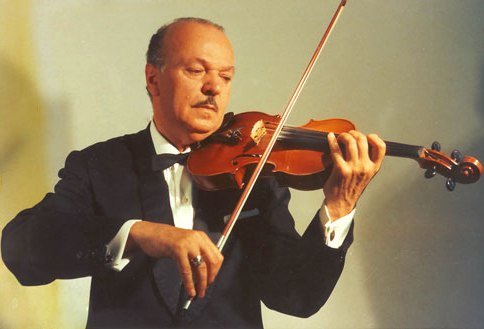
Secondo Casadei was born on April 1st 1906 in Sant’Angelo di Gatteo. Despite his parents’ plans for his future to join the family tailoring business, he felt irresistibly drawn to the world of music. After a few years of classical music studies, he abandoned his violin lessons to dedicate himself to his great passion: ballroom music.
Thanks to his natural skill, at the age of 16 he made his debut with an orchestra. However, he had even greater ambitions and in 1928, with stubborn determination, he formed his own sextet.
This orchestra was absolutely innovative. Besides having a clarinet, two violins, a double bass and a guitar, he included two uncommon instruments for those times, a saxophone and drums. With this orchestra, he played his compositions all around the world, eventually writing as many as 1078 dance tunes in the varying rythms of the waltz, the mazurka and the polka. This “son of Gatteo” is considered to be the true founder of “Liscio”, the traditional dance music of Romagna.
At the beginning of the ‘30s, Secondo Casadei began writing a string of songs in the Romagna dialect “to be nearer to the people’s heart”. Every small event of simple regional life was an excuse to compose a song, such as his great hits ‘Burdela Avèra’, ‘Un bès in biciclèta’ and ‘Balé burdèli’.
In the post-war period, the music from the United States depopulated many dance-halls, but Secondo Casadei obstinately continued to defend his ‘Liscio’ music. Then, in 1954, Secondo composed his famous song, “Romagna mia”, which thanks to its’ distribution among jukeboxes and the broadcasting on the then popular Capodistria Radio, became well known, even across international borders. At the end of the ‘50s, his nephew Raoul joined the orchestra bringing freshness and new energy. The two Casadei began to form a winning team, writing successful songs which were very much appreciated by their audiences.
In 1966, Secondo Casadei received the honour of ‘Cavaliere’ of the Italian Republic, and in the same year, at the great request of Patron Vittorio Salvetti, he participated with significant success in the summer music festival for excellence: the Festivalbar. On 19th November 1971, to the shock and sadness of all of his numerous friends, “The Strauss of Romagna”, as the director and writer Leandro Castellani had named him, died. The Maestro’s legacy was taken over by his nephew Raoul Casadei and much later, in 2000 by Raoul’s son, Mirko.
Secondo Casadei always selected skilled players for his orchestra, but most importantly, he had the ability to make people want to dance. He used to say that the “Liscio” music “would never die if even a single person still wanted to dance”. Today, Riccarda Casadei, Secondo’s daughter, keeps his philosophy and tradition alive, while Mirko keeps playing his music.
In 2004, Gatteo Council enthusiastically participated in the celebrations to mark the 50th anniversary of “Romagna mia”, a real anthem for the inhabitants of Romagna. That year on the morning of the 19th June, grandparents with grandchildren, families and young people formed a human chain all along the Adriatic coast of Romagna, singing together the famous song.
In 2006, to celebrate the centenary of the birth of Casadei, the director Davide Cocchi produced the documentary film, “L’uomo che sconfisse il boogie” (the man who defeated the boogie), which received the First Prize for the Best Folk/ Pop/Jazz Documentary at the Roma Music Doc Fest, the Festival taking place at the Palazzo Venezia. The film plot took inspiration from a 1954 article published in the newspaper “Il Resto del Carlino”, which reported with some admiration, a ‘battle’ between musicians, where one evening, Secondo Casadei’s orchestra was acclaimed by the crowd, thus reducing an American orchestra to silence. Secondo was then defined as, “the man who beated the Boogie!”
The supremacy of the “Liscio” music in the dance hall was restored even after the “invasion” of foreign music in the immediate post-war period. “Casadei the Liberator!” was the headline in an article in another newspaper “Il Corriere della Sera”. From that moment on, Secondo Casadei was no longer just a composer, a player and a musician, but had become a myth, and a flag.
In 2014, on the occasion of the 60th anniversary of “Romagna mia” a rich programme was dedicated to this song and its composer: concerts, literary meetings and also an exhibition of memorabilia and rarities staged at the Palace of Tourism in Gatteo Mare.
In 2022, on the occasion of the 50th anniversary of his death, and the municipality of Gatteo celebrated the occasion with a series of events and an exhibition
